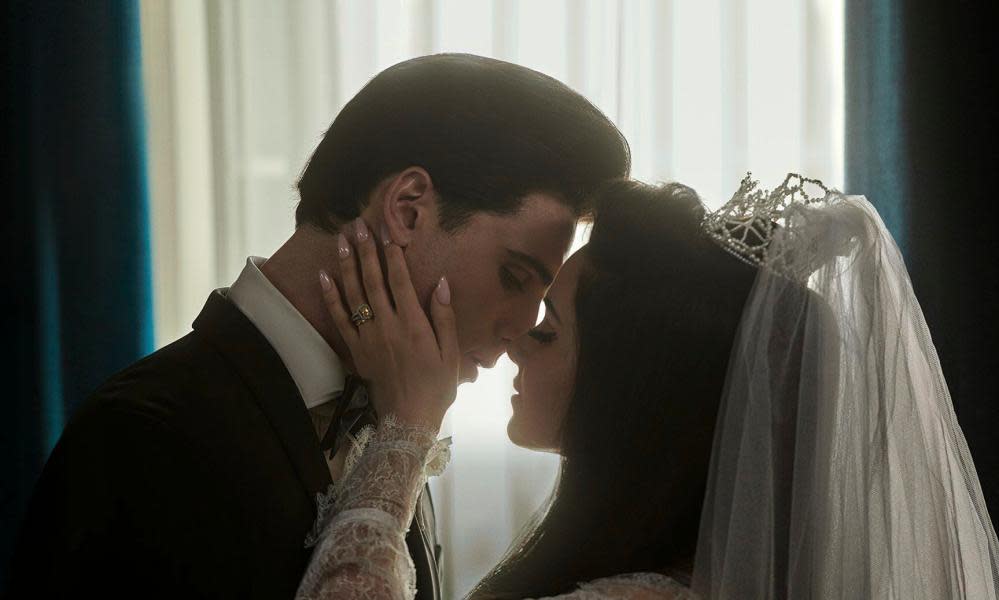Priscilla review – Sofia Coppola paints an absorbing, intimate portrait of Elvis’s wife

Child bride, infant sacrifice, bobbysoxer concubine: Priscilla Presley, wife of Elvis, is all these in Sofia Coppola’s eerily gripping, queasily claustrophobic portrait of marital loneliness, trapped behind the kitschy prison gates of Graceland while the King is away on tour, or shooting movies with glamorous worldly female co-stars and a creepily subservient male entourage. Priscilla becomes Memphis’s very own Lady Diana, with Ann-Margret or Nancy Sinatra in the Camilla Parker-Bowles role.
The film is based on Elvis and Me, Priscilla’s 1985 memoir of the marriage, and demonstrates Coppola’s characteristically sisterly and non-judgmental intimacy with her heroine. The details, the atmosphere of Priscilla’s bizarre married life, its stretches of boredom and silence; all seem very real. As an insider account, this is a welcome corrective to Baz Luhrmann’s outsider fantasy Elvis and it redoubles what I think of as Coppola’s reputation as the Betty Friedan of 21st-century cinema, presenting us with her distinctive take on feminine mystique.
Cailee Spaeny plays Priscilla, the 15-year-old schoolgirl living on a 1950s West German military base with her mom and army dad; she gets invited to a party hosted by Elvis Presley doing his military service. Elvis is rather unassumingly played by Jacob Elordi, who is shrewdly directed by Coppola in such a way that there are no Elvis-impersonation pyrotechnics to upstage Spaeny’s Priscilla. Presley is a perfect gentleman and does not press his attentions improperly on Priscilla. Instead, staggeringly, he persuades her parents to let her live at Graceland, with his own cantankerous father, Vernon, legally in loco parentis, so she can attend Catholic high school there. But when will they get married? And when will Elvis want to have sex with her?
There is dark comedy in the extraordinary fan-wish-fulfilment life that Priscilla is living – at first. She gets to make out with Elvis in the evening and then pout over her schoolbooks in class the next morning; while all her schoolmates are dreaming of kissing Elvis, she is living the dream. But then the awful truth emerges. Elvis refrains from sex with Priscilla (while very clearly not refraining elsewhere), fetishising her intact quasi-childlike innocence while subjecting her to a festival of misogyny, coercion and control in parallel to the way he is kept in line by his overbearing manager, Colonel Tom Parker (who, perhaps oddly, doesn’t appear in the film).
Related: Priscilla Presley: ‘Elvis’s spirit speaks to me – it’s beautiful’
The pure strangeness of Graceland is pungently conveyed: its weirdly modest smallness, the white grand piano, the creamy-oatmeal carpet. Theirs was a co-dependent life, very much centred on drugs, uppers and downers, to which Elvis introduced Priscilla early on; this was followed by an experiment with LSD, part of Presley’s wary and shortlived interest in the counterculture. And Graceland was the incongruously provincial location for it all.
Eventually, Priscilla gets a baby, Lisa Marie, and an adult makeover closely policed by Elvis (who turns out to have strident views on women’s fashion); Priscilla’s hair and makeup job, intentionally or not, makes her look like one of the GoodFellas wives. But the movie argues that, as Priscilla grew up, Elvis became more and more infantilised, paranoid and charmless, especially in his endless Vegas residencies.
Coppola’s portrait is absorbing, especially in Priscilla’s child phase, and if it is less distinctive in its final section, as Priscilla becomes more briskly disillusioned and realistic about what to expect, then that is to be expected. Her credulous servitude and innocence is more dramatic and more poignant. This film says a great deal about Elvis and the dysfunctional business he was in and Priscilla’s modest integrity and courage.
• Priscilla screened at the Venice film festival and is released on 27 October in the US.

 Yahoo Movies
Yahoo Movies 
